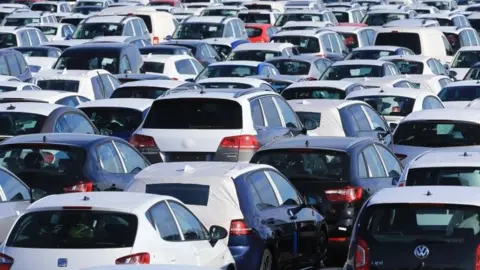UK car sales fall 9.3% in July says motor trade body
 PA
PANew car registrations fell 9.3% in July from a year earlier, according to the Society of Motor Manufacturers and Traders (SMMT).
The trade body said the market was falling - for the fourth month in a row - amid "growing uncertainty" over plans for Brexit.
About 162,000 vehicles were sold last month.
So far this year, 1.56 million cars have been sold, down 2.2% from a year earlier.
Mike Hawes, SMMT chief executive, said: "The fall in consumer and business confidence is having a knock on effect on demand in the new car market and government must act quickly to provide concrete plans regarding Brexit.
"While it's encouraging to see record achievements for alternatively fuelled vehicles, consumers considering other fuel types will have undoubtedly been affected by the uncertainty surrounding the government's clean air plans."
The government said last month it was to ban all new petrol and diesel cars and vans from 2040 amid fears that rising levels of nitrogen oxide threaten public health.
Delayed impact
Samuel Tombs, chief UK economist at Pantheon Macroeconomics said the continuing fall in sales showed consumers were now holding back on "big-ticket purchases" because of a lack of confidence rather than just a shift in the timing of purchases.
Earlier this year, many customers had brought forward car purchases ahead of changes to Vehicle Excise Duty in April.
Mr Tombs warned that financial deals to buy cars may become more expensive, and the price of cars could rise by about 3% in both 2018 and 2019 because of the weaker pound.
"Car sales tend to lag consumer confidence by about six months - many of the cars registered in July will have been ordered several months ago - so the recent post-election slump in sentiment indicates that the downturn has further to run," he added.

Analysis: business correspondent, Theo Leggett
There are two key points to be drawn from these figures.
First of all, the SMMT is now explicitly linking the fall in registrations to uncertainty over Brexit. That wasn't the case earlier in the year, when the figures were all too clearly distorted by the effects of a big change in the Vehicle Excise Duty regime.
And it is notable that the biggest fall in demand has come from business buyers - particularly those looking to buy 25 cars or fewer, although larger fleet purchasers also seem to be growing more cautious.
Secondly, the political backlash against diesel cars, driven by concerns about urban air quality, is having a significant effect. Registrations of new diesels were down 20% compared with the same period last year. Their market share has fallen considerably
Meanwhile sales of electric and hybrid cars are growing. A year ago they had a market share of just 3%. Now it's 5.5% - still fairly small, but gathering momentum rapidly.
A fall in demand for new cars this year had been widely expected, after a period of rapid growth. But today's figures suggest that the political climate is having a significant influence on the direction the industry is heading in.

